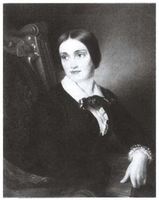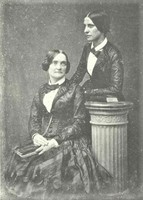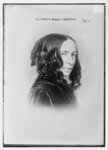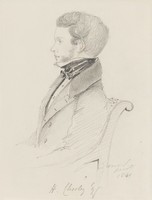Letter from Elizabeth Barrett Browning to her sister Arabel, Oct 22, 1852
Dublin Core
Title
Subject
Description
Credit
New York Public Library
see also: The Brownings Correspondence by Wedgestone Press
Creator
Source
Date
Type
Letter Item Type Metadata
Text
The desk has come, dearest dear Arabel, and your letters came right, all of them,—& we go off tomorrow morning at ten oclock on the railroad, to Peninni’s extreme joy. Say no treason against the desk, we beg of you. It was precisely the convenience of it, .. of leaving it out till the last moment .. that made Robert forget it .. but he will be on his guard another time.
Do write a word of enquiry about Mr Lowell’s address to Mrs Procter, & she will tell you the number in Devonshire street. Dont delay it, because the Lowells will be back soon from Scotland & away to America.
Mrs Corkrane I have often mentioned to you though you may not remember. She is the wife of the correspondent to the Herald, a very striking looking & intellectual woman .. a little pretentious perhaps, & peculiar in her costume, .. but good & noble in all her impulses. I always liked her .. and the excess of her warm feeling towards me, .. the way in which she overwhelms us with all manner of affectionateness, .. has drawn me to her closer, since we came last to Paris. Her husband is the kindest, widest-hearted of men,—I like them both. It was she who lent me some of Swedenborg’s treatises last winter (though she is not very deep in them herself) and she has just pressed upon me three volumes by the same writer “Sur la religion vraie,” which I refuse (are’nt you glad, Arabel?) on the ground that the papal authorities would naturally eschew any book whatever, upon true religion, & that I should therefore have to sacrifice them at the custom-house. We are invited to go to her this evening to hear Miss Cushman read, .. and, as Robert’s Milsand is to be there, though it is our last night I believe we shall try to go. I forgot to tell you that we met Miss Cushman .. the American actress, you know .. on the famous balcony from whence we saw the great entrance on that saturday. She has with her Miss Hayes who translated George Sand, and we all three had a great deal of talk about various matters. Never was a woman in the world less like an actress. I cant conceive how such a woman would look on a stage, or speak, or gesticulate—she has just the look of a sensible woman, not at all young. I understand that she & Miss Hayes have made vows of celibacy & of eternal attachment to each other—they live together, dress alike, .. it is a female marriage. I happened to say, “Well, I never heard of such a thing before.” “Have’nt you?,” said Mrs Corkrane, .. “oh, it is by no means uncommon.” They are on their way to Rome, so I dare say we shall see a good deal of them. Though an actress, Arabel, Miss Cushman has an unimpeachable character, & is as much distinguished for her general intelligence as for her professional aptitude—a little more, perhaps.
M. Milsand has spent two evenings with us. He is altogether admirable– A more noble & conscientious intellect it would be impossible to find. Of the present state of affairs he talks with the insight & wise moderation which are so characteristic of him. What he objects to most is that in the case of dissaffection & discontent on the part of the people there is not sufficient provision for the legal act of protest, & that the natural consequence must be a collision between the nation and the government– At the present moment, all goes smoothly, because the masses are satisfied. Louis Napoleon represents the democracy—(which always I have told you—) but let the occasion of dissatisfaction arise, & there must arise a storm .. unless the case be provided for by a modification of the existent laws. At present, says he, the masses are pleased—there is abundance of work, & the interest of the working classes is much considered. He is in sympathy with the masses. I cant give you my own impressions better than in M. Milsand’s words. I agree with him .. I accept his views. He tells me that the stringency upon the press is applied to newspapers, but scarcely at all to books. If you were to read what Proudhon has just published, you English would be a little surprised—just as Robert confesses himself to be. The Buonapartist fervour throughout France is, M. Milsand says, “a little childish”—but “there are various motives at work.”— M. le Moine,one of the cleverest writers for the ‘Debats’ was also on our balcony. He observed sarcastically that he “supposed the next time Louis Napoleon came into Paris, the people would worship his horse, .. for nothing else would be left to them”. By the way, he rode upon a beautiful English horse, which everybody was admiring even then.
You ought to hear Peninni talk on these subjects. He repeated to me a letter he wants to write to you, but it would take too much time & patience for him to write it in his peculiar fashion, just now. I will tell you it therefore– “Dear Alibel, Peninni see Napoleon pass– Plompity babuffs, plompity bwams, plompity twumpets. Peninny cwy Vive Napoleon. Napoleon tate off chapeau Peninni.” So there’s Peninni’s letter for you word for word.
Robert says that he can make you understand the Lowell address without writing to Mrs Procter. Turn round the Procter house, the first house to the right, at the end of a long wall, because a garden belongs to it. Try again.
Remember, Arabel, Bummy is much nearer in relationship than you are. Aunt Jane wears crape—only, in the very slightest form, be it understood, & not as you do,—& with white sleeves & collars– As to Arlette, her silk hat is trimmed with lace & bugles simply. I am sure you are ‘deeper’ than you need be,—& that horrible horrible mourning is so unbecoming & melancholy! The little Reynolds’s were in black the other day when they came here—upon which I exclaimed to Arlette. She told me it was her economy to make them wear out their black pelisses, & that otherwise she would not have thought of such a thing. Mr. Reynolds has written to ask Bummy to come to them for the winter. She will probably do so, I fancy—dont you? Peninni went to have tea with the children yesterday. Very kind it was of Arlette to ask him. Her little Miratry is a head taller than he is—what a disgrace! Her children are both very pretty, I think, particularly Miratry, who has a beautiful complexion & eyes. She does’nt know a letter so Peninni preserves his superiority. The way that child writes––as fast as I can dictate the letters .. is really surprising. I shall send you, if I can lay hands on it, his drawing of our fireside—& his other drawing of Napoleon on horseback.
God bless you my beloved Arabel– Tomorrow we are gone. Until we get to Lyons we shant decide upon the Mont Cenis. The weather is perfectly lovely– Every day we have been out at the restaurateur,—and indeed even Wiedeman has gone with Wilson, for a two francs dinner between them, ordering his ‘toupe’ and “little fisks” for first course– Today Robert & I went after dinner to the Hedleys,—& they insisted on keeping me, so that I could’nt get to the Corkranes after all–
God bless you,—we are gone. It is nearly eleven at night; & I must put up this letter. Best love to all of you—& to dearest Trippy. Write to Florence, poste restante, & let me find a letter from you & one from Henrietta. Robert’s dear love with that of
your forever attached Ba.
Berry Selwyn shall have the books, which will be directed to you– So glad I am that dear Minny is better.
From
To
Location
Geocode (Latitude)
Geocode (Longitude)
Secondary Texts: Comments
"[...] RB had met her in London at Chorley's and told EBB soon afterwards, in a later dated [10 August 1845], that he thought 'Miss Cushman . . . . clever ad truthful-looking" (BC [Philip Kelly, The Brownings' Correspondence], 11, 21). In a letter dated 21 October 1852, EBB told Kenyon that she 'never sw anyone so unlike my idea, or anybody's idea, of an actress" (MS at Wellesley)." (509, n. 6)





